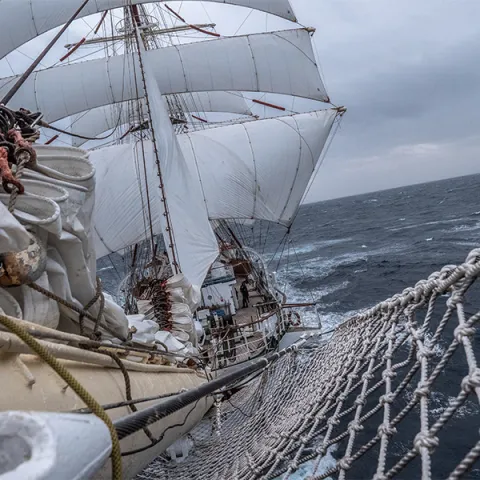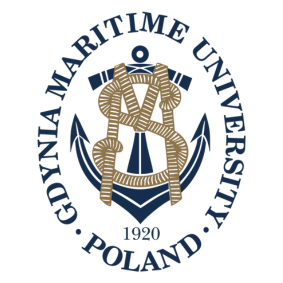Navigation
The Navigation degree programme is designed for those who see their future at sea — individuals drawn to the challenges and adventure of a maritime career. It’s also the perfect choice for candidates fascinated by sailing and eager to experience unforgettable voyages aboard the University’s famous tall ship, Dar Młodzieży.
Graduates earn the equivalent of a Bachelor of Engineering degree (Inżynier), and after completing the required sea-going service, obtain the Officer of the Watch (Merchant Navy) certificate, qualifying them to serve as deck officers and, with experience, to progress to the rank of captain.
The programme is delivered in accordance with the International Convention on Standards of Training, Certification and Watchkeeping for Seafarers (STCW), ensuring education that meets the highest global standards for maritime professionals.
Study plan: https://wn.umg.edu.pl/karty/siatki/s,2025,6
- Maritime Transport – marine specialisation
- Applicants for bachelor’s degree programmes must hold a secondary school leaving certificate that entitles them to apply for higher education in the country where it was issued.
This may include:- a Polish Matura certificate (or other European equivalent)
another recognised secondary school leaving certificate (or equivalent qualification) entitling the applicant to apply for higher education in their own country
If your certificate was issued outside Poland, it must:
- be legalised or bear an apostille (except for documents issued in EU countries or International Baccalaureate and European Baccalaureate diplomas);
- be translated into Polish by a sworn translator; and
- if required, be accompanied by a statement* from the Director of NAWA (Polish National Agency for Academic Exchange) confirming that it is recognised for further study in Poland.
A detailed list of countries whose certificates require a NAWA statement is available on the NAWA website:
https://nawa.gov.pl/en/recognition/recognition-for-academic-purposes/applying-for-admission-to-first-long-cycle-studie
- English Language proficiency certificate.
- Maritime Health Certificate
- Navigation
- Navigation Equipment
- Astronavigation
- Ship Stability and Construction
- Maritime Transport
- Meteorology and Oceanography
- Maritime Practice
After completing the course, you will be able to:
- navigate and plan a voyage for a selected ship
- keep a navigational watch and manoeuvre a ship in accordance with COLREG requirements
- organise safe teamwork
- communicate using available communication systems – GMDSS
- operate ship systems and basic installations
- supervise and maintain safety systems – fire protection installations and systems – evacuation and life-saving systems at sea
- after the first year, students complete a basic course in safety and security, which is necessary to undertake maritime training on the Dar Młodzieży ship,
- after obtaining the above-mentioned certificates and a maritime health certificate, students receive a Seaman's Book for the registration of supervised training,
- during their studies, after the 6th semester and completing a 3-month internship, students can obtain a seaman's certificate, which can facilitate obtaining attractive internships on commercial ships,
- part of the training and specialist courses includes a teaching process; classes during the course of study allow students to obtain certificates issued by the Maritime Administration,
- in addition, after completing the 7th semester, students can obtain all the certificates required by STCW for the Maritime Administration to issue a Watchkeeping Officer's certificate,
- for students who want to acquire additional skills, specialist training courses are conducted in accordance with the needs of shipowners,
- a diploma of completion of studies, together with the required maritime practice and specialist training, allows students to obtain a Watchkeeping Officer's Certificate
Completion of this course of study will enable you to obtain the following, certified by the Maritime Administration:
- watchkeeping officer diploma
- certificates confirming the qualifications and skills required for employment as a watchkeeping officer on selected types of ships, in accordance with the requirements of the STCW Convention
Candidate: 7-10 days, on board the Dar Młodzieży, before the start of studies, familiarisation with the functioning of the ship, internship confirming aptitude for teamwork, behaviour in emergency situations and during drill alarms.
Nautical: 30-36 days, on board the Dar Młodzieży, after completing the first year, basics of navigation, additional improvement of students' skills in the field of safety and security, familiarisation of students with the basics of ship operation, working with ropes and ship rigging, working in manoeuvring positions, maintenance work and basic ship knowledge.
Navigation: 30-36 days, on board the Dar Młodzieży, further development of navigation skills, working with a navigation chart in the ECDIS system, use of navigation equipment and astronavigation to determine the ship's position and verify magnetic compass readings.
Manoeuvring and radar: 14 days on board the Horyzont II, acquisition of practical skills in ship manoeuvring and navigation using available navigation systems and equipment.
Operational: the remaining 9 months on selected commercial ships, allowing you to obtain a watchkeeping officer's certificate after graduating, together with 12 months of supervised practice.
As a graduate of the Navigation programme, you’ll be ready for a global career at sea and ashore.
You can work on almost all types of commercial vessels around the world, including specialised ships operating in the offshore sector. With experience gained as a watchkeeping officer, you may also continue your career in shipowners’ offices or maritime administration.
Your technical knowledge and practical training will open doors to roles in companies that design, supply and maintain navigation, safety and security systems, as well as other advanced technologies used on modern vessels.


